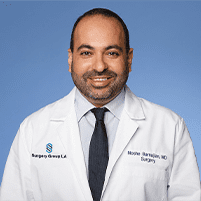Rectal Cancer Specialist

Moshe Barnajian, MD
Minimally Invasive and Robotic Colorectal Surgeon based at Cedars Sinai, Los Angeles
Rectal Cancer Q & A
What is rectal cancer?
Rectal cancer is cancer inside your rectum, which is the last segment of your large intestine that connects with the narrow passage leading to your anus. Colorectal cancer is a cancer that occurs in your rectum and colon. With early detection and proper treatment, rectal cancer is often curable.
What are the symptoms of rectal cancer?
If you experience the following signs or symptoms of rectal cancer, see Dr. Barnajian and his team for cancer screening:
- Blood in the stool
- Mucus in your stool
- Changes in bowel habits
- Constipation or diarrhea
- Frequent bowel movements
- Abdominal pain or pain with bowel movements
- Fatigue or weakness
- Unexplained weight loss
- Iron deficiency anemia
- Feeling like your bowel can’t empty completely
Even if you don’t experience symptoms, talk with Dr. Barnajian about when to begin colorectal cancer screenings, which is often at age 50 or younger if you have additional rectal cancer risk factors.
What are the risk factors for rectal cancer?
Though anybody can develop rectal cancer, the following factors increase your risk:
- Older age
- Being African American
- Inflammatory bowel diseases and diabetes
- Family or personal history of rectal cancer
- Inherited genetic syndromes
- Diets rich in red meat and low in vegetables
- Obesity
- Being sedentary
- Smoking and drinking alcohol
- Radiation therapy
These factors increase your risk of colon cancer in addition to rectal cancer. Routine colorectal screening is important to detect cancer before it spreads to other parts of your body.
How is rectal cancer diagnosed?
A colonoscopy is the most accurate screening test for rectal cancer. Dr. Barnajian examines the lining of your rectum and colon using a flexible tube with a camera attached to it. He uses specialized instruments to remove polyps and other tissues in your rectum for analysis.
If you have rectal cancer, other diagnostic testing procedures, such as blood tests, MRIs, and CT scans, help determine the stage of cancer you have and whether it’s spread to other areas of your body.
What is the treatment for rectal cancer?
Rectal cancer treatment often involves removing cancerous tissue, chemotherapy, radiation therapy, or combinations of these methods. Dr. Barnajian is highly qualified to perform minimally invasive and advanced colon, rectal, and anal surgical techniques. He’s skilled in laparoscopic and robotic colorectal cancer resection procedures.
Be proactive about colon and rectal health with routine screenings. At the first sign of blood in your stool, pelvic pain, or unusual bowel changes, schedule an appointment at the office of Moshe Barnajian, MD, over the phone or online today.
